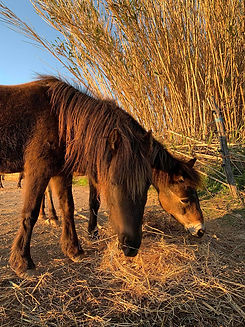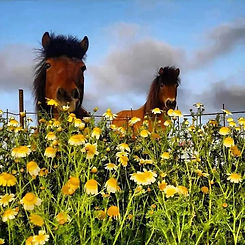4 DAY COURSE
SKYROS, GREECE
COURSE OUTLINE
We are excited to invite you to join us on the first Learning Wild course on the island of Skyros in March 2024. Skyros, one of the Greek islands in the Agean sea, is home to the Skyrian horse, one of the rarest horses in the world.
Learning Wild courses are designed to provide a unique experience for participants from around the world to explore the role of free-living equids in cultures, environments, and histories in a variety of international locations. We attract participants from a wide range of careers and backgrounds which allows us to facilitate conversations that engage with all levels of society and create opportunities to engage with the local community and needs of the horses and culture in which we are hosting the courses. We firmly believe that, by providing a space in which people can learn about the unique traits of the horses we are visiting, they can better understand the role these horses play in the history of the landscape, the local culture, and the environment. We believe that, by providing these experiences and perspectives on horses we can move forward to encourage greater biodiversity with horses as part of the dynamic ecosystems that can improve the health of our planet.
Join Dr. Emily Kieson as she conducts research in the social lives of horses and explores applications to domestic equine welfare and developing stronger friendships with our own horses.
Share the experience and enthusiasm for the observational study of feral ponies with Bonny Mealand who is passionate about enabling others to learn from the richness of this perspective. In addition there will be local experts and representatives from relevant organisations.
For the Learning Wild Skyros Course which will take place in mid-March 2024, we will work closely with Amanda Simpson from the Skyros Island Horse Trust - Friends of the Skyrian Horse to better understand the exceptional history of the Skyrian horse; a breed that has been immortalised in history and myth and is a living representation of the richness of Greek history. As an animal with such a unique role in history, the Skyrian horse is a symbol of how we can move forward with a greater respect for nature while still honouring the past.
We will discuss the history of these horses on the island as well as their role in the landscape, place in the culture and relationships with the people on the island. Historically, Skyrian horses have roamed the tiny island and played a large role in the ecosystem. There are still Skyrian horses living freely on the southern areas of Skyros and we will visit some of these locations to explore the vegetation and landscape that has served as their home for thousands of years and see if the free-living horses that still roam there are visible in a way that allows us to observe them without disrupting their natural behaviours.
SKYROS ISLAND HORSE TRUST
Saving the skyrian horse through conservation, welfare and education intiative. Shot by Horsefly films.




ITINERARY
This is an outline of the structure of the 4 days.
The delivery of the course will be determined
mainly by the weather.
ARRIVAL
Arrive and settle in
Thursday, 14th March
Friday, 15th March
DAY 1: Orientation & Introductions
The Art of Observation
Equine evolution, physical and behavioural
Putting together a simple ethogram.
DAY 2: Environment, Ecology
& Conservation
Regenerative grazing, conservation grazing and the possibilities of sustainable environmental practices with horses as part of the landscape. We will explore the ways communities can come together to improve both economic and environmental growth and the potential for this here in Skyros.
Saturday, 16th March
Sunday, 17th March
DAY 3: History & Culture
Working with Amanda and her volunteers at the Skyrian Horse Trust to contextualise their history and heritage, understand the cultural and historical changes which have led to restricted grazing for the Skyrian horses and the need to preserve the breed in a more domestic setting. We will learn about the ways in which the Trust is working to provide enrichment and behavioural needs to replicate and mirror the Skyrian horses natural environment while also improving the soil health.
DAY 4: Behaviour
Human & Horse
Through group discussion we will contextualise and evaluate our observations and learning, along with bringing our unique local, regional and global perspectives to explore the ways we can translate what we have witnessed and learned here in Skyros with the settings, situations and environments we live and work to improve equine welfare, horse:human relationships, improved environmental practises and more by sharing ideas and interdisciplinary collaborations.
Monday, 18th March




YOUR HOSTS

Bonny Mealand (Touching Wild) qualified as an Equine Podiatrist in 2005 and has been committed to understanding, implementing and promoting a whole horse approach to health and well-being ever since. Bonny specialises in working with wild, free-living equines and “difficult” domestic equines by building trust and helping them learn to be handled in a low stress way.
A short clip of Bonny working with some Takhi (equus prezwalski) can be
viewed here -
BBC Inside the Zoo.
Bonny is committed to constantly learning as much about and from equines as possible. Believing that it is possible to define what a life of quality looks like at both a species and individual level. She then uses this perspective to implement a high standard of welfare into their domesticated lives.
She is also a retained Firefighter, Somatic Yoga and Mindfulness Teacher and BHS Welfare Advisor and is a MSc student at the Dick vet (University of Edinburgh) studying Equine Science.
To learn more about Bonny’s
work please click here:
Touching Wild | Facebook | Instagram
She is also the UK representative
of the world renown Equine Ethologist Lucy Rees www.lucyrees.uk

Emily Kieson (Equine International) holds a PhD in Comparative Psychology, a MS in Psychology, and a graduate degree in Equine Science.
Her research focuses on equine behavioural psychology, equine welfare, and horse-human interactions as they apply to both horse owners and equine-assisted activities and learning programs. Her current research focuses on equine affiliative behaviours to study how horses create and maintain social bonds and how those can overlap with human affiliative behaviours to create authentic lasting friendships between horses and humans.
She also has a passion for supporting sustainable systems of horse management and husbandry that promote physical and psychological welfare of the horse while simultaneously supporting sustainable ecosystem practices on small and large scales (for both feral and domestic equids).
To learn more about Emily and Equine International please click here:
Equine International
ITINERARY DETAILS
TERRAIN GRADING
Moderate
As we will be exploring the environments inhabited by the ponies, challenging terrain may be encountered so a reasonable level of fitness is suggested
WEATHER
March is the first month of spring in Skyros - weather can be changeable and packing accordingly is recommended. A summary of weather expectations can be found at www.holiday-weather.com/skyros/averages/march/
TRAVEL TO SKYROS
The airport of Skyros is located on the northern side of the island, in the region of Agios Petros. It operates only domestic flights from Athens and Thessaloniki. There are no charter flights to Skyros from other countries. The flight time from Athens to Skyros is 40 minutes and the main flight operators to Skyros are:
TRAVEL IN SKYROS
There are taxi services to get around the island and we will have a small minibus to take us around.
ACCOMMODATION
We have a limited amount of accommodation available in shared houses, book early to secure your bed.
We also offer an option for the cost of the course only with no accommodation provided.
Local places to stay can be found at:
www.greeka.com/sporades/skyros/hotels/
Booking.com - Accommodation Search Results
COURSE COST 4 day course - price per participant
EARLY BIRD
+ Accommodation
(Private Double Room)
£875
£955 after 1st March
EARLY BIRD
+ Accommodation
(IShared Twin Room)
£640
£720 after 1st March
No Accommodation
(Rate for the Week)
£400
£480 after 1st March
EARLY BIRD
Maximum Participants - 12
Charity, student, researcher and low income concessions available
INCLUDED in the Course Cost
The following costs are included in
the price of the workshop:
• All the educational teaching and materials
• Tea, coffee, biscuits
NOT INCLUDED in the Course Cost
The following costs are not included in
the price of the workshop:
• Travel to and from Skyros
• Food and drinks
• Accommodation
REFUND & CANCELLATION POLICY
Learning Wild courses are kept small to allow for higher levels of participation by atendees. Once a spot has been paid and reserved, it is no longer available for other potential participants and we oten have to turn people away. As a result, we have strict cancellation policies. For UK-based events participants wishing to cancel can get 50% of their paid amount refunded if they cancel before 30 days prior to the event. There is no refund given if participants cancel within 30 days of the event.
Any participant wishing to cancel may request that their non-refundable payments be carried over to a later Learning Wild course. The location and date of the Learning Wild course to which the credit can be transferred does not have to be declared at the time of cancellation. Individuals wishing to apply credit to a Learning Wild course should contact the course schedulers as soon as they know what course to which they would like to apply the credit. Learning Wild does not reserve spots in courses for any participant there are no guarantees of spots for people holding credit.



